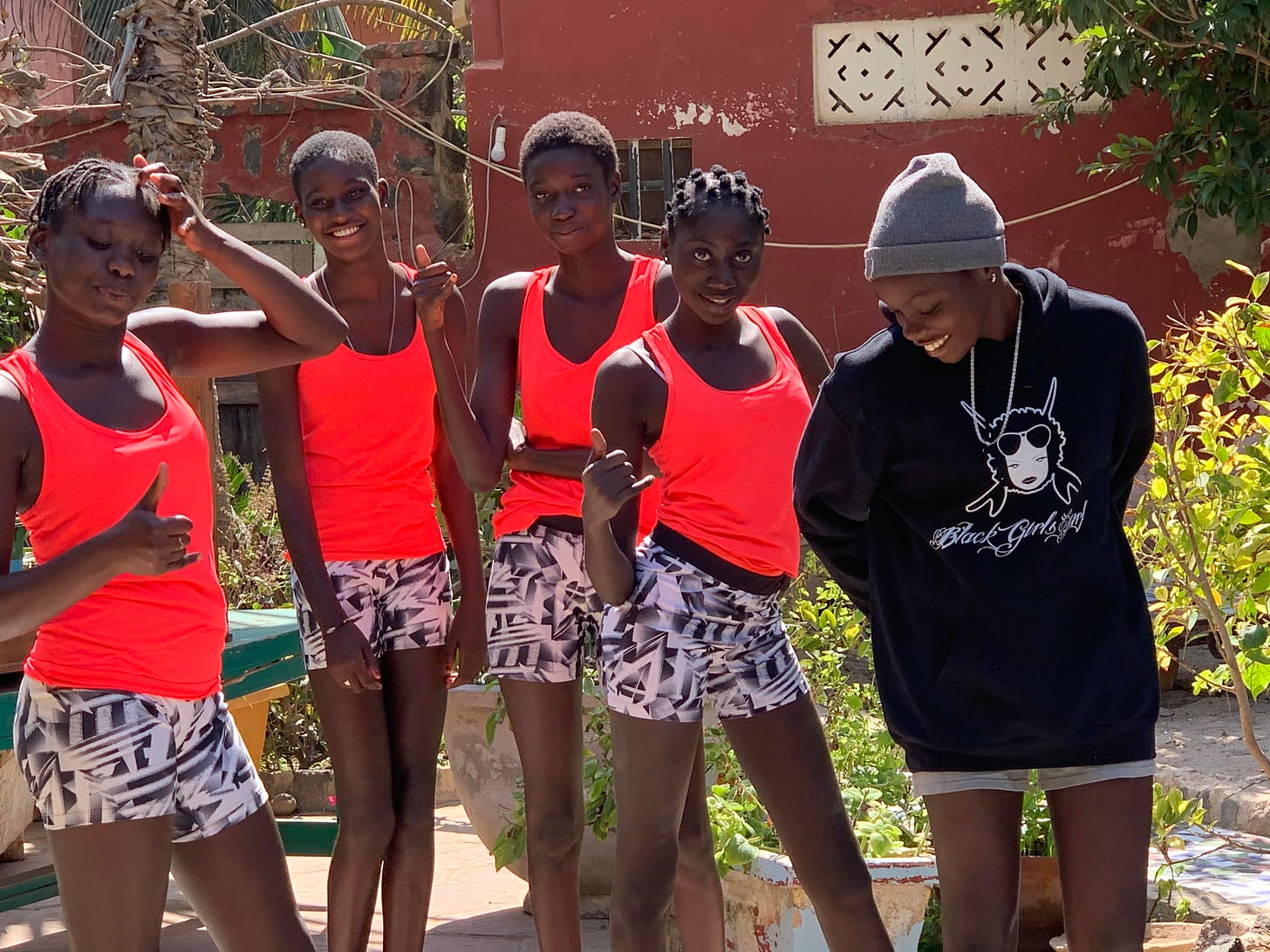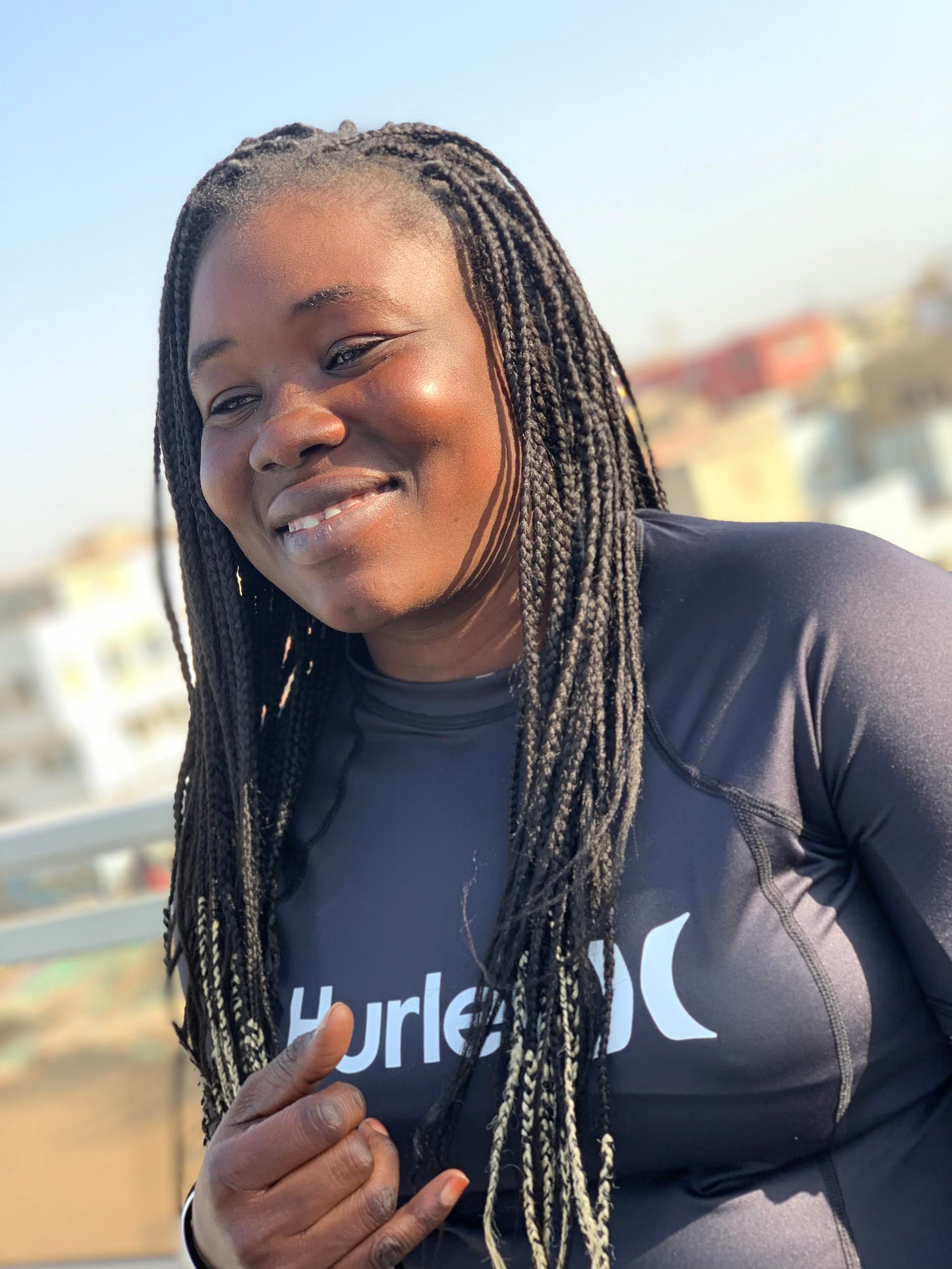#2 Black Girls Surf: changing the visual for tomorrow
The organisation led by Rhonda Harper is reshaping the industry from within by training, coaching and mentoring girls of the diaspora whose career goal is competing in professional surfing.
As she talks to me on the phone from N’gor, Dakar, Rhonda Harper is on the ledge overseeing the training of her mentee Khadija “Khadjou" Sambe, the first female surfer in Senegal. “I go over her sessions, so that we can later do the scolding in real time while we’re cooking dinner”, she jokes with a cheerful, infectious laugh. For the past couple of months, this Kansas City native has been working in N’gor, putting together a new surf therapy program for her Black Girls Surf Senegal camp, a model for her 10 other camps worldwide, from California to Jamaica, Ghana, Nigeria, Liberia or Sierra Leone. Founded in 2014 with the aim of helping young girls in surf camps get to a professional level, BGS has quickly evolved into a household name and stood out in the surfing landscape for its determination to jumpstart change from inside the industry, regularly working with the World Surf League and collaborating with brands like Hurley. It’s no small feat. Then again, Rhonda is a force of nature.
Growing up landlocked in Kansas City, Rhonda was initiated to surf culture by watching 1964’s Muscle Beach Party one Summer. “Stevie Wonder was in it, and I could connect to the Beach stories because of that. I thought if Stevie could be there, I could be there”, she says. Already a capable pool swimmer, she finessed her skills further after the family moved to San José, California, where she still remembers going to Lighthouse Beach as a kid. “It was off the beaten path and you had to climb down the cliff to get in at that time. Maybe my mum picked it because she knew of racial problems in the area, since she worked in Civil Rights. I remember the first time the tide came through and washed all our stuff away. We didn’t know about tides, and me and my siblings thought that was the most amazing thing ever.”
By the time she was fifteen, she was getting in trouble for standing up for herself in an all-white school, so her parents decided to send her to Hawaii, where her sister was in college on the North Shore. There, it all changed. “Everyone was brown. I was living in a resort, skateboarding, teaching aerobics in my free time, swimming in a pool on my backyard, walking to the beach first thing in the morning every single day. I just sat there and I swear that beach was mine”, she remembers, laughing. It was there that she rode a surfboard for the first time - tandem -, and after that she bought a second-hand 6’4 and simply taught herself to surf. Soon, she was papering her room with surf mag pictures, developing a passion for flashy 1980’s boards, and summoning up the courage to talk to Buttons at Sunset Beach. “When I eventually came back home, I was a whole different person.” As an adult, she worked as a celebrity stylist (Eddie Murphy was among her clients) and as a reporter for the Black Athlete Sports Network. “I found myself looking for Black surfers on assignment, only to go back home empty handed every single time. That’s when I decided I was going to create the kind of world I want to see.”

What would later become Black Girls Surf actually started as a contest named Africa Surf International, an invitational with surfers from the diaspora taking place in Sierra Leone. “The idea was to have sponsors see us in real life, riding waves, proving we’re as good as white surfers”, says Rhonda. “So we started looking for surfers all around West Africa. That’s when we realised finding girls was next to impossible, so we ended up scouting the surf camps for instructors. And we met Khadjou that way.” Because of ebola, the contest was delayed indefinitely (“It’s gonna happen at some point though”, Rhonda sates. “Once I say I’m doing something, I don’t care how long it takes, I’ll do it.”). But Black Girls Surf was born.
It hasn’t all been smooth sailing - between ebola, Trump’s travel ban and now coronavirus -, but the speed at which the project has grown is mind-blowing. Largely self-funded at the beginning, and later funded through donations, it has recently teamed up with Hurley. “Several companies contacted us in the aftermath of George Floyd’s death, but I wanted to make sure whatever we built would still live on after the momentum around Black Lives Matter waned. Hurley wanted to build a foundation, do grassroots training for kids and create real opportunity.” Today, the brand contributes to the BGS scholarship program, training and gear. Each one of the BGS camps has its own coordinator, plus a staff of five to ten people. Rhonda oversees everything, all while coaching five girls in N’gor and working on the new Surf Therapy program, “a therapy process aimed at making it easier for teenagers to adjust to professional surfing and its issues, which range from exclusion and competition to body image”.
Simultaneously, Rhonda is coaching Khadjou for Senegal’s Nationals and, ultimately, the 2024 Olympics. “Originally, the idea was to send both Khadjou and Kadiatu Kamara, another one of our surfers from Sierra Leone, to Tokyo. But things are so hazy right now - they can’t figure out the timetable, not to mention the countries that are the qualifiers are all shut down because of covid - we thought it was best to wait, polish our athletes and aim for 2024. There’s something I say to Khadjou: you don’t always have to be the first.” Ultimately, Black Girls Surf is about community and progression. “This is what we do, and it’s not pretty every single day” says Rhonda. Funnily enough, she adds, she often gets approached by people offering to curate the BGS Instagram account. “They tell me it needs to be more aesthetic. Instead, we’ll do a whole week where we just show everyone’s falls, including Khadjou’s and mine. We don’t need the poses, the makeup or the curated glass of coconut water, and we certainly don’t need to be cute. We’re real, we’re not for show”, Rhonda reflects at the end of our talk. “When you start mimicking the oppressor, you lose the message. Being real, that’s what’s liberating.”
Khadjou Sambe on pioneering women’s surfing in Senegal
Under a quiet demeanour and a calm, reflective voice, Khadjou Sambe hides a steely conviction and true grit. After all, it takes exceptional boldness to break with the established way of things and become a pioneer of women’s surfing. Khadjou is the first female pro surfer in Senegal and, under Rhonda Harper’s mentoring, is currently training for competitions ultimately leading to the 2024 Paris Olympics. Here, she talks about her surfing journey.
“Since I can remember, every man in my family has surfed: my brother, my uncle, my cousin… Here in N’gor we are constantly playing in the water, and I spent my childhood kayaking around the surfers until, at 13, it came to me: why weren’t there any girls riding waves? That’s when I decided to properly learn how to surf. It wasn’t easy at first; I had to fight for every single wave and out back I kept hearing the boys around me speaking among themselves, saying I wouldn’t be able to surf because I was a girl. But I kept at it; I just loved how in the sea all problems seemed to vanish. Then, for about a year and a half, I had to give it up. It had become too much of a problem for my family. Tradition here states that women should stay at home, cooking and cleaning, and my parents were worried that something might happen to me. This is the sport I love, though, so I found a way to continue surfing. I just had to. I started teaching and even considering a professional career, in spite of all the people who told me I would never be able to get a sponsorship. To be honest I was about to give up on that dream when Rhonda got in touch, at first about the Sierra Leone contest, then eventually becoming my coach. Last year, we went on a training trip to California. We toured the beaches of San José, Santa Cruz and Pacifica; it was a bit of a culture shock. The water here in Senegal is always clear and blue, and the Californian kelp kind of freaked me out… Then there was the aggressiveness in the water, which made it impossible for me to get waves at first, until I figured out a strategy: every time a guy would shout “eh!” as I took off, I would just answer “sorry, I though you said ‘go’”. I ended up becoming friends with an older surfer that would share waves with me. But I was shocked by the way kids, especially the boys, screamed at older surfers. We just don’t do that back home! Right now, my days consist of three to four hours in the water, two and a half if it’s a cold day, followed by three or four hours of training. The goal is 2024, inshallah. It’s intense, but I just love it. The water, the waves, the sharing, the community… Surfing here is like belonging to a family. Oh, and the guys who made it hard for me at the beginning? They’re now teaching their own daughters and sisters how to surf.”





